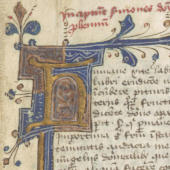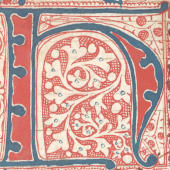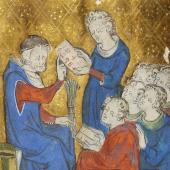Medieval preachers and teachers
800 years of Dominican books
A major task of the life of a Dominican was and is to preach. Preaching in Latin was normal when given to their own community or to other clerical audiences. If preaching to the laity the vernacular language would be used and probably the theological content simplified. Unfortunately hardly any vernacular Dominican sermons have survived in written form, but collections of Latin sermons survive in many manuscripts.
The role of the Dominicans in educating the laity evolved from their function as confessors, particularly to members of the higher social classes. Inevitably this led to involvment in the education of their children. Vincent of Beauvais (ca 1200–ca 1264), became involved in advising on the education of the French royal family for whose teacher he wrote a treatise on the education of children. A few years later Laurent d’Orléans, prior of St Jacques, Paris, and confessor to King Philippe III le Hardi of France (d. 1285) wrote a catechism for the king. The Dominicans continued to have a role in catechetical texts, above all the Catechism of the Council of Trent (the Roman Catechism) written to assert the teaching of the Church as a response to Protestant views introduced at the Reformation. The main writers and editors of that text published in 1566 were the Dominicans Egidio Foscherari, Francisco Fureiro, Thomas Manriquez and Eustachius Locatelli.
Image reproduced by kind permission of the Master and Fellows of St John’s College.



